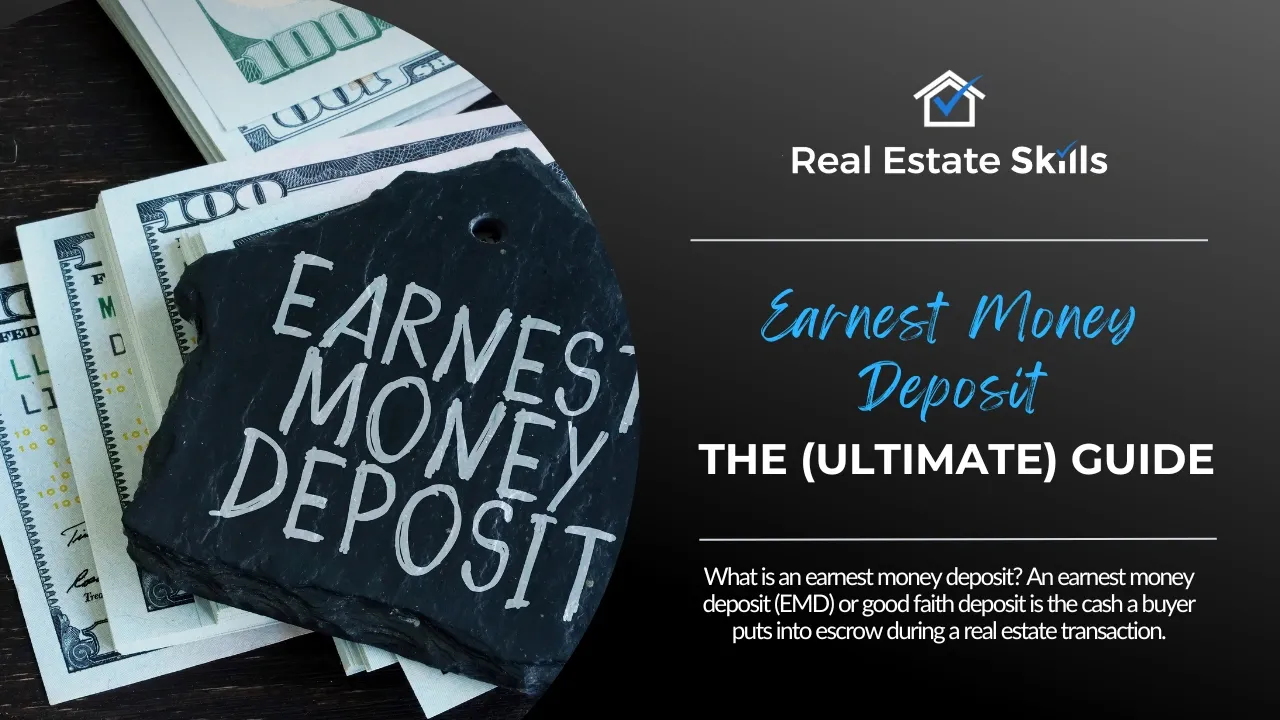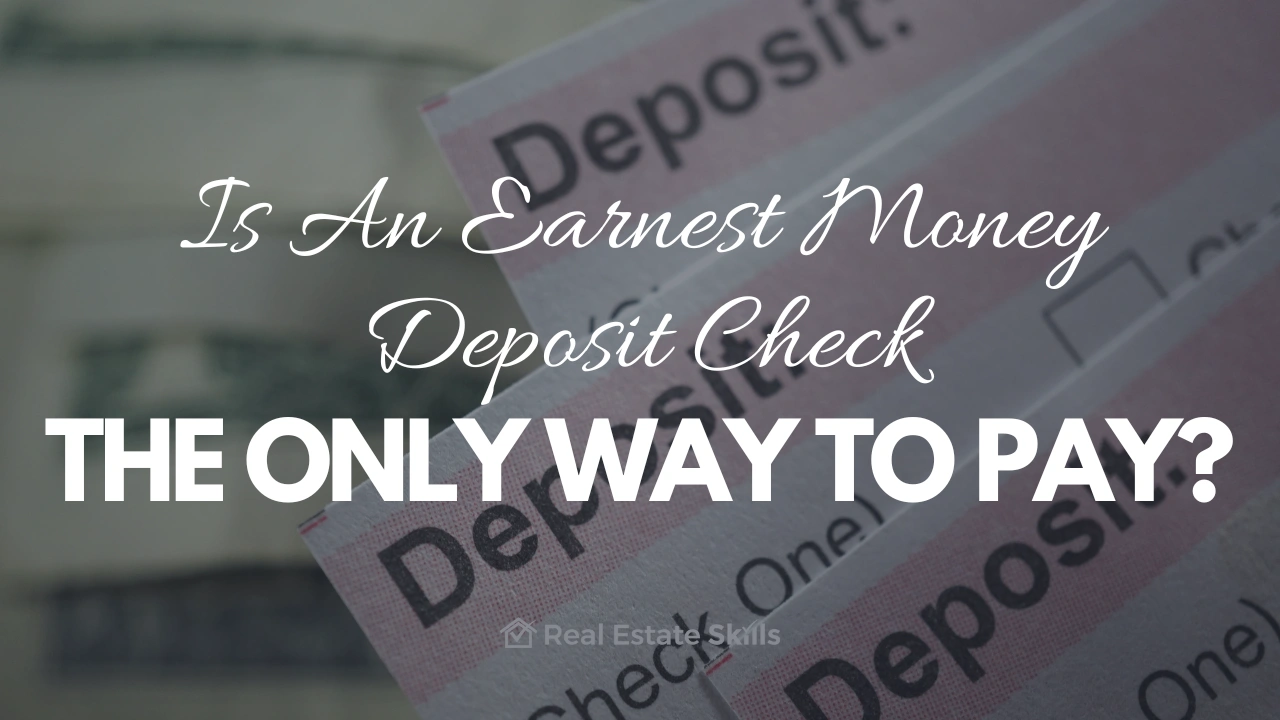
Earnest Money Deposit: The (Ultimate) Guide
Mar 25, 2025
Ever been interested in buying a home in a competitive market but weren't sure how to make your offer stand out from the rest?
One of our favorite methods is to make an offer with a substantial earnest money deposit!
An earnest money deposit is a proven way to show a seller you are interested in buying their home.
It shows a level of commitment from the buyer and acts as security for the owner when agreeing to sell their property to a particular buyer.
Continue reading Earnest Money Deposit: The Ultimate Guide! Use this menu to jump to your section of choice:
- What Is An Earnest Money Deposit?
- How Much Earnest Money Deposit Is Enough?
- Why Should You Pay An Earnest Money Deposit?
- Who Do You Give Your Earnest Money Deposit To?
- Is An Earnest Money Deposit Check The Only Way To Pay?
- Is Earnest Money Deposited Right Away?
- Is A Larger Earnest Money Deposit Amount Better?
- How Can You Lose Your Earnest Money Deposit?
- Is Earnest Money Deposit Refundable?
- When Can I Get My Earnest Money Deposit Back?
- How Long Does It Take To Get My Earnest Money Deposit Back?
- Who Gets The Earnest Money Deposit If The Buyer Backs Out?
- How Can You Protect Your Earnest Money Deposit?
Ready to Take the Next Step in Real Estate Investing? Join our FREE live webinar and discover the proven strategies to build lasting wealth through real estate.
Whether you're just getting started or ready to scale, we'll show you how to take action today. Don't miss this opportunity to learn the insider tips and tools that have helped thousands of investors succeed! Seats are limited—Reserve Your Spot Now!
What Is An Earnest Money Deposit?
An earnest money deposit (EMD), also known as a good faith deposit, is an amount of money a buyer puts down on a property after an offer is accepted to show commitment to the transaction. It is a way of protecting the seller while the buyer is under contract to purchase the property.
The deposit is not additional or excess money a buyer is giving to the seller. Consider it more of a down payment to reserve the contract on the property. There are several possible outcomes depending on what happens during the home buying process.
The earnest money deposit is usually either:
- Applied to the buyer and purchase price at closing
- Refunded to the buyer if contract is rightfully canceled
- Kept by the seller if the buyer defaults on the contract
The earnest money deposit may be any amount (usually up to 5% of the sales price) and is held in an escrow account until the sale is complete.
For more, watch this short video titled What Is An Earnest Money Deposit?
How Much Earnest Money Deposit Is Enough?
The amount of earnest money you should give for an earnest money deposit depends on several factors, including the purchase price of the property and the environment of the real estate market you are investing in.
A rule of thumb is to offer 3-5% of the purchase price as a good earnest money deposit amount.
If you need help knowing exactly how much to include with your offer before signing a contract, you should speak with an experienced real estate agent in your market.
An active agent can give you advice on what a customary earnest money deposit in that local real estate market will be, and even help assess the competitive nature of an area.
For example, let’s take a look at California!
If you purchase a house in San Diego, you'll see that it's a very competitive market. This means that in order to have your offer stand out, you may need to include a higher earnest money deposit. This is because more people are also shopping for the property you are interested in, resulting in multiple offer situations.
On the flip side, if you want to buy a home in a more rural area like Temecula, it might not be as competitive as San Diego. This means you won’t be as compelled to include such a high earnest money deposit.
Why Should You Pay An Earnest Money Deposit?
You should pay an earnest money deposit as it may be obligated by the terms agreed upon in the purchase and sale agreement. Most purchase contracts used by Realtors are written to encourage an earnest money deposit. This helps the seller feel confident that the buyer won’t change their mind during escrow and cause the sale to fall through.
In many real estate markets, an earnest money deposit is expected by sellers and their agents. Paying an earnest money deposit is like insurance for the seller, especially in a competitive real estate market. It shows the seller that the buyer is willing to commit financially to the deal, even before the deal closes. In case the buyer defaults, the seller may be entitled to the deposit as damages.
When the seller goes under contract with a buyer, they can no longer sell the property to anyone else. When the buyer pays an earnest money deposit, it ties up their money thus limiting their ability to go around and put a bunch of other properties under contract.
Who Do You Give Your Earnest Money Deposit To?
When an offer on a home is accepted, depending on your purchase agreement the earnest money deposit should be given to either the:
After an earnest money deposit is received by either of the above parties, it is placed in a separate bank account, such as a trust account, where it is not to be mixed or commingled with other funds.
There can be a whole range of issues that arise if the process is not handled correctly. Here are a few things you should keep in mind once the seller accepts the offer:
- Never give the earnest money deposit DIRECTLY to the seller (issues such as fraud may occur)
- Be aware of wire fraud. Scammers can falsely identify themselves as sellers, take the earnest deposit, then disappear with the buyer's funds.
- Make the EMD check payable to a third party such as a title company, an escrow company, a real estate brokerage, or a legal firm.
- Check to see that the money goes into an escrow account or trust account.
- Make sure you have a receipt and follow up to make sure the deposit has been completed.
- DON’T authorize the deposit until the transaction is done.
You should always have an advisor or an agent who can give you advice on how to go about the situation. They should know the best practices to keep the earnest money deposit safe and compliant.
 Is An Earnest Money Deposit Check The Only Way To Pay?
Is An Earnest Money Deposit Check The Only Way To Pay?
No, an earnest money deposit check is not the only way to pay. The most common ways of paying an earnest money deposit are:
- Personal Checks
- Cashier’s Checks
- Wire Transfer
While the sale is being completed, the funds are held in an escrow account by one of the following:
Remember to never pay earnest money deposits with CASH! If you pay with cash, the seller will not be able to verify where the funds came from. They will also not be able to report it on the Closing Disclosure Statement as earnest money.
As mentioned before, this money is not extra money you are handing out. This money goes towards the down payment and closing costs, and the funds are held by a neutral third party until the transaction closes.
Is Earnest Money Deposited Right Away?
Earnest money is usually deposited within 72 hours of both the buyer and seller coming to a contractual agreement. Though, as with most items in a contract, this time period is always negotiable.
It benefits the buyer to have a longer window of time allowed to submit the earnest deposit. However, most sellers and their agents will push for the buyer to submit the EMD as soon as possible after a contractual agreement is reached.
Is A Larger Earnest Money Deposit Amount Better?
Generally, the answer is yes! A larger earnest money deposit is better at helping your offer stand out from the competition.
That said, there's no exact or set earnest money deposit amount that you should offer. It is up to the buyer and seller to agree on what is an appropriate earnest money deposit amount to get the deal done.
Buyers typically stay within a percentage range of 1%- 5% of the sales price, however that amount can increase significantly in more competitive markets and properties.
In a competitive environment, it is recommended that you don’t just offer the minimum amount because it would show the seller that you are not very interested or committed to purchase the home.
Speak to a real estate agent on the standard earnest money deposit you should be offering, as it can vary depending on the area and property you are looking at.
If you are looking to buy a home in a real estate market that is very expensive and competitive, it's always better to offer a larger earnest money deposit.
You might even get lucky because the seller could accept your lower purchase price if you propose a higher earnest deposit. It all comes down to understanding the individual deal and knowing what matters most to the seller!
 How Can You Lose Your Earnest Money Deposit?
How Can You Lose Your Earnest Money Deposit?
As a buyer, you can lose your earnest money deposit under certain conditions. It boils down to knowing whether the deposit is refundable or non-refundable at different points during the home buying process.
In most circumstances, the buyer's deposit is refundable as long as you can rightfully cancel the contract. However, there are conditions which would allow the seller to keep your earnest money deposit in full!
Here are situations where you can lose your entire earnest money deposit amount:
- Failing to Meet Deadlines: Be aware of all deadlines that come with signing a purchase agreement. These include contract contingencies, such as inspections, appraisals, and financing deadlines, as well as the close of escrow date. If these timelines are not met, the seller may be able to cancel the contract and keep your deposit.
- Agreeing to a Non-Refundable Earnest Money Deposit: In a competitive environment, you might offer a non-refundable EMD to show you are extremely committed to buying the property. This means that once you submit the EMD, the seller can keep the deposit if the deal doesn't close for any reason.
- Home Is Not “The One”: Buying a home is an emotional decision for many. For this reason, some buyers may get cold feet even after removing all contingencies. Buyers should understand there is no "emotional contingency," so if they end up backing out of the transaction, they will lose their earnest money deposit.
- Bail Due To Personal Reasons: If you cancel the transaction due to personal reasons such as illness, divorce, losing or changing jobs, you may lose the EMD. In this case, you can try to reason with the seller to return the deposit. However unless a contingency is in place, most contracts allow the seller to keep the earnest money deposit when the buyer backs out due to personal reasons.
- Falling In Love With Another Property: With so many different options of homes coming to market every day in various locations, it's easy to get distracted and fall for a home - even while you're in escrow on another home! If you want to cancel and have no other valid reason, you will most definitely lose the EMD. The seller would likely have no sympathy with your position and would have to look for another buyer.
- Not Understanding What Selling “As Is” Means: Some sellers specify in their listing that they will not pay for any repairs, such as termite damage, structural damage, or even minor cosmetic upgrades needed. This may cause a buyer to pay more in the long run than what they were initially expecting at the time of offer acceptance. This is why the home inspection contingency is so important, so a buyer can assess the true cost of the property before closing and determine if they can really afford it.
Is Earnest Money Deposit Refundable?
Yes, an earnest money deposit can be refundable depending on what is stated the contract. When contingencies are included in the purchase agreement, the sale has certain conditions that must be met or else the buyer can cancel the contract and have the deposit refunded.
Here are some of the most common contingencies that are used in real estate contracts to ensure the earnest money deposit is refundable:
Inspection Contingency
This allows a specified time period when a buyer may conduct physical property inspections. Inspections provide buyers with a better understanding of the condition of the property before closing. Depending on results of inspections, buyers may have an opportunity to negotiate with the seller if any defects are found during investigations.
If the buyer and seller come to an agreement regarding the physical condition, the sale continues. If not, the buyer is able to walk away from the sale and get the earnest money deposit refunded.
Financing Contingency
If you need to purchase a home with the help of a mortgage loan, you would have to include a financing contingency with your offer. This makes the buyer's offer contingent upon being able to obtain mortgage financing.
Mortgage borrowers go through a process called underwriting. Underwriting is a process in which lenders look at a borrowers credit history, tax returns, and income to see if they are worthy enough to be approved for a loan. If for some reason the loan is not approved, the buyer may back out from the sale without losing their earnest money deposit.
Appraisal Contingency
A home appraisal decides the market value of a property. An appraisal contingency protects the buyer in case the sale price does not match the market value.
For example: A buyer and seller agree to a price of $350,000 but the appraisal comes in at $300,000. The lender uses the appraised value to decide how much money they will lend on the property (see: loan to value ratio). If the seller doesn't agree to a price reduction, the buyer would be responsible for covering the extra $50,000. In this case, the buyer would have to find another way to finance the home or can safely walk away without losing the deposit.
Title Contingency
The title of a house is a record of the current and former ownership. This legal document shows the history of who has owned the house, as well as any liens. A title contingency ensures the transfer of a clear and marketable title to the buyer.
There are instances when a title cannot be researched or cleared in time before the closing. That is when it becomes your choice to risk it and continue with the closing, or walk away without the risk of taking over an encumbered title.
When Can I Get My Earnest Money Deposit Back?
When you submit your earnest money deposit to a deal, the only way to get it back is by rightfully cancelling the purchase agreement.
Otherwise, you'd be closing on the property and it gets applied towards the purchase price, or rather the deal is cancelled and the seller keeps it due to a buyer breach of contract.
Here are some of the instances when you can cancel the deal and get your earnest money deposit back:
- When the buyer is not satisfied with the results of the physical home inspection, they are allowed to cancel the contract and get their earnest money deposit back.
- When the home appraisal comes in too low. When the property does not appraise for the contracted sales price, the buyer can cannot obtain the desired home loan. Thus, if an appraisal contingency is present, the buyer can cancel and get her earnest money deposit back.
- When the buyer cannot obtain a loan; as long as there's a financing contingency in place the buyer can get the good faith deposit back. It's recommended to get a pre-approval letter before shopping for a home.
- When the seller has not properly disclosed all material defects within the property by the agreed upon deadline.
How Long Does It Take To Get My Earnest Money Deposit Back?
It takes about 2 to 5 business days after a contract is cancelled for you to get your earnest money deposit back. Contracts may specify a timeline for return of good faith deposits, but it's generally done quickly.
The holder of the deposit, usually a title company, real estate broker, or real estate attorney withdraws the funds and mails a check to the buyer. Since the EMD is held in escrow by a third party, the seller must first agree to release the deposit before funds are sent back to you.
When there's a dispute, getting the seller to release the deposit can cause delays. In the case where the seller does not agree to release the deposit, the first thing you should do is carefully review your purchase agreement with an attorney to see where you stand.
If the seller still doesn’t agree you would have to take the problem to court. Depending on your state's criteria and monetary limits on these courts, you may be able to take it up in small claims court.
No one wants to go to court, but if the situation is handled differently from what the sales contract states, you may have no choice but to mediate or take it to court. It can be very costly working with a lawyer, so make sure you are working with someone you can trust.
Who Gets The Earnest Money Deposit If The Buyer Backs Out?
If you've sold a home, you've likely wondered, 'Who gets the earnest money deposit if the buyer backs out?' The answer to this depends on the situation, as it could be the buyer or the seller.
Simply put, you can't assume that you'll automatically keep the earnest money when a buyer backs out of real estate purchases. You may be allowed to retain the deposit when the buyer is in breach of the agreement and doesn't complete the sale.
Let’s say for example, a property is in escrow and the contract includes a home inspection contingency. During the home inspection, the buyer sees a few things such as plumbing and electric issues. The buyer asks the seller to pay for some repairs in order for them to continue with the sale.
The seller does not agree with the request, so the buyer decides to terminate the purchase agreement. In this case, the buyer can walk away safely with their earnest money deposit refunded.
Now let’s say the buyer and seller have come to an agreement, have a completed sales contract, and the buyer has removed all of her contingencies. Then, the perfect home in another neighborhood comes up for sale and the buyer decides to cancel the agreement to pursue the other home.
The buyer then tells the seller that they change their mind about the house. In this situation the buyer has no right to get their earnest money deposit back, so the seller would be the one to keep it.
How Can You Protect Your Earnest Money Deposit?
Having money on the line can be a bit unnerving, so how can you protect your earnest money deposit?
One way to protect your earnest money deposit would be to include an escape clause in your contract. This is essentially a timeframe in which you are able to walk away from the sale for any reason and keep your earnest deposit. Though not favorable for sellers, this is certainly an excellent way to protect your good faith deposit.
If your seller does not agree with the all encompassing escape clause, you can protect your earnest money deposit by using one of the contingencies we've already mentioned:
- Financing: able to cancel the contract if you aren’t approved a loan for the mortgage
- Title: you do not have enough research to prove that there is not enough information to prove that the home is debt free from previous owners
- Home Inspection: the inspection reveals issues and the buyer and the seller don’t come to an agreement on potential repairs
- Appraisal: Sale price and market value do not match and there is no negotiation between the buyer and the seller.
- Sale of Current Home: When your offer is contingency on selling your current home, you can walk away from the transaction if you do not sell your current home.
*For in-depth training on real estate investing, Real Estate Skills offers extensive courses to get you ready to make your first investment! Attend our FREE Webinar Training and gain insider knowledge, expert strategies, and essential skills to make the most of every real estate opportunity that comes your way!
Final Thoughts
Real estate purchases come with many important details to pay attention to, especially earnest money deposits.
Remember, an earnest money deposit is not an additional expense or money that's wasted by the buyer. It can help buyers stand out and make a statement to sellers, even when all other contract terms are the same.
In order to protect your money, make sure you read your purchase agreements carefully, consult with real estate professionals in your market, and stay in communication with all parties throughout the deal.
We hope this Ultimate Guide helped you learn the basics about earnest money deposit. Now go out there and buy the house or investment property of your dreams!
Ready to Take the Next Step in Real Estate Investing? Join our FREE live webinar and discover the proven strategies to build lasting wealth through real estate.
Whether you're just getting started or ready to scale, we'll show you how to take action today. Don't miss this opportunity to learn the insider tips and tools that have helped thousands of investors succeed! Seats are limited—Reserve Your Spot Now!
*Disclosure: Real Estate Skills is not a law firm, and the information contained here does not constitute legal advice. You should consult with an attorney before making any legal conclusions. The information presented here is educational in nature. All investments involve risks, and the past performance of an investment, industry, sector, and/or market does not guarantee future returns or results. Investors are responsible for any investment decision they make. Such decisions should be based on an evaluation of their financial situation, investment objectives, risk tolerance, and liquidity needs.








